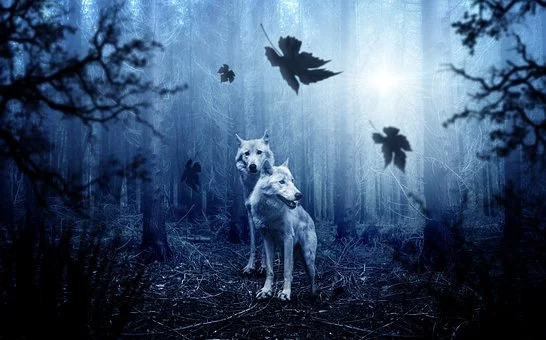Names have a deep meaning in every culture and community. They are an essential aspect of our identity and cultural heritage. Wolves have been revered in Native American cultures, and their names are significant and deeply rooted in tradition.
In this article, we will explore the native wolf names, their meanings, symbolism, and significance in Native American cultures.
Overview of Wolves in Native Culture
Wolves have played a vital role in Native American culture for centuries. They are often seen as powerful and revered animals, symbolizing loyalty, strength, and endurance. Wolves have been depicted in Native American mythology as teachers, protectors, and spiritual guides.
Naming Your Wolf
When choosing a name for your wolf, it’s essential to consider their personality, appearance, and behavior. A name that reflects your wolf’s unique qualities and characteristics can create a special bond between you and your pet.
It’s also important to remember the cultural significance and symbolism of Native American wolf names and their relevance to Native American culture.
Tips for choosing the perfect name for your wolf include researching traditional Native American names, considering the meaning and symbolism behind the names, and selecting a name that reflects your wolf’s personality and traits.
Here is a list of some native wolf names/wolves names along with their details:
- Gray Wolf (Canis lupus):
Also known as the Timber Wolf or Western Wolf, the Gray Wolf is native to North America, Europe, and Asia. It is the most widely distributed and common wolf species. - Red Wolf (Canis rufus):
The Red Wolf is native to the southeastern United States and was declared extinct in the wild in 1980. But, reintroduction programs have been successful, and wild populations have been reestablished in eastern North Carolina. - Ethiopian Wolf (Canis simensis):
The Ethiopian Wolf is native to the Ethiopian highlands and is the most endangered canid in the world, with fewer than 500 individuals remaining. - Indian Wolf (Canis lupus pallipes):
The Indian Wolf is native to the Indian subcontinent and is a subspecies of the Gray Wolf. It is found in the states of Gujarat, Rajasthan, Maharashtra, and Madhya Pradesh. - Arctic Wolf (Canis lupus arctos):
The Arctic Wolf is native to the Arctic regions of North America and Greenland. It is also known as the White Wolf or Polar Wolf. - Mexican Wolf (Canis lupus baileyi):
The Mexican Wolf is native to the southwestern United States and Mexico and is a subspecies of the Gray Wolf. It is one of the most endangered wolves in the world, with only around 200 individuals remaining in the wild.
Note: The traditional names for wolves in indigenous cultures may vary.
- Eastern Wolf (Canis lycaon):
The Eastern Wolf is native to the northeastern United States and southeastern Canada. It is also known as the Algonquin Wolf or Great Lakes Wolf. - Maned Wolf (Chrysocyon brachyurus):
The Maned Wolf is native to South America and is the largest canid in the region. It is not a true wolf, but is a member of the “wolf-like” canids. - Mongolian Wolf (Canis lupus chanco):
The Mongolian Wolf is native to the grasslands and steppes of Mongolia and northeastern China. - Caucasus Wolf (Canis lupus cubanensis):
The Caucasus Wolf is native to the Caucasus Mountains in Eastern Europe and Western Asia. - Tundra Wolf (Canis lupus albus):
The Tundra Wolf is native to the tundra regions of Siberia and is a subspecies of the Gray Wolf. It is also known as the Russian Wolf or the Mongolian Wolf. - European Wolf (Canis lupus lupus):
The European Wolf is native to Europe and is a subspecies of the Gray Wolf. It is also known as the Common Wolf or the Forest Wolf.
It’s worth noting that the classification and naming of wolves is a subject of ongoing research and debate among scientists, and new information may change the names or subspecies of wolves in the future.
Naming Traditions
Naming traditions differ from tribe to tribe, but they all share the importance of naming in Native American culture. Native American wolf names are often given based on the wolf’s behavior, appearance, or symbolism. The name given to a wolf is thought to reflect the wolf’s spirit and power.
Traditional Native American Wolf Names
The Lakota Sioux are one of the most significant tribes in terms of naming wolves. Their names often reflect the wolf’s power and symbolism in Lakota Sioux culture. For example, “Lakota” means “friend,” and “Zitkala” means “bird.”
The Navajo tribe has a unique naming tradition for wolves, with names that reflect their spiritual and cultural beliefs. For example, “Ashkii” means “boy,” and “Dibe” means “sheep.”
Other tribes have their own naming traditions for wolves, with names that reflect the wolf’s characteristics or behaviors. For example, the Apache tribe’s wolf names include “Klah” meaning “honor,” and “Kanati” meaning “hunter.”
Modern Native American Wolf Names
In modern times, Native American wolf names have become increasingly popular among pet owners and animal enthusiasts. Popular Native American wolf names include “Thunder,” “Sage,” and “Spirit.” Other names are more creative, such as “Moon,” “Dakota,” and “Wolfie.”
Related: Warrior Wolf Names
Conclusion
Native American wolf names are significant and deeply rooted in tradition and cultural beliefs. Traditional names reflect the importance of wolves in Native American mythology and culture, while modern names are a reflection of our fascination with these incredible animals.
Whether you are naming a wild wolf or a domesticated pet, remember the importance of choosing a meaningful and fitting name that reflects their unique personality and identity, and honors the cultural significance of Native American wolf names.
Related: 500+ Wolf Names And Their Meanings (Both Male Wolf Names and Female Wolf Names)
